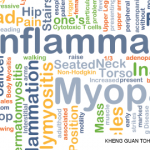
BOSTON—Associations between rheumatic diseases and cancer have been noted clinically for many decades, but only recently have some of the risk factors and possible mechanisms become clear. Rheumatologists should be aware of which connective tissue disease patients may be at increased malignancy risk and when it’s time to screen for cancer.

“It is our responsibility as rheumatologists to include cancer screening as part of our practice,” said Ami Shah, MD, MHS, assistant professor of medicine at Johns Hopkins Scleroderma Center in Baltimore. Dr. Shah and two other experts spoke on the latest research on the connections between autoimmunity and cancer, and what steps rheumatologists may take to diagnose malignancies quickly and refer those patients for therapy, at the ACR/ARHP Annual Meeting in Boston on Nov. 16, 2014. At the session, Current Understanding of Malignancies in Connective Tissue Diseases, they discussed risk factors that may prompt cancer screening.
Cancer–Myositis Connection
Although over the last century many anecdotal reports pointed to a connection between cancer and myositis, the association between the two diseases has long been questioned by scientists due to referral biases, small studies without appropriate control groups or unclear diagnostic criteria, said Frederick W. Miller, MD, PhD, chief of the Environmental Autoimmunity Group at the National Institute of Environmental Health Sciences in Bethesda, Md. Only in the past several decades have data drawn from Swedish and Australian registries confirmed increased rates of cancers in myositis patients, especially ovarian, breast and pancreatic malignancies. Most patients developed cancer within two to three years of their myositis diagnoses, and dermatomyositis patients had the highest risk, Dr. Miller said.
“Many studies have also suggested that cancer is the leading cause of death when it occurs with either polymyositis or dermatomyositis, and thus, the focus should really be on treating the cancer in these patients,” said Dr. Miller. Rheumatologists should look for important risk factors to identify candidates for more careful cancer screening, he said.

Patients who are 45 years or older and male; have rapid unexplained weight loss after a myositis diagnosis; present with cutaneous necrosis, vasculitis or dysphagia; have high erythrocyte sedimentation rates (ESR) or high C-reactive protein levels; or are found to have autoantibodies to p155 may be at higher risk of malignancy, Dr. Miller noted. In addition, autoantibodies to nuclear matrix protein (NXP-2) or transcriptional intermediary factor (TIF1ɣ) may also be associated with cancer in myositis patients.



